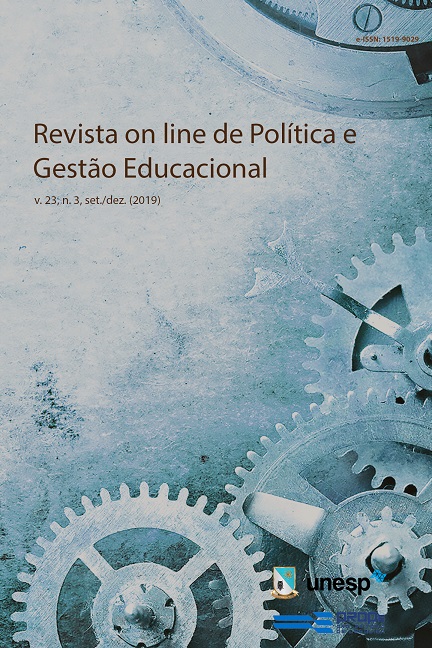Developing music talent in basic education
DOI:
https://doi.org/10.22633/rpge.v23i3.12369Keywords:
Education, Special Education, Music Education, Music talent.Abstract
Music education and the specialized attention to the talented students are provided by the Law 13.278/16 and Law 13.234/15, both stemming from the Law 9394/96. However, many Brazilian students have no access to music education, neither a specialized educational service. If the music subject were implemented in all schools, as happens with physical education and arts, many students could benefit from this teaching, be identified and develop their potentialities. That is why this theoretical essay aims to discuss about music teaching and the development of music talent, so this subject can be increasingly discussed and, perhaps, can mobilize managers of basic and higher education for the relevance of this modality of education for human development and, in the case of musical talent, quality of life and opportunity for those who manifest it.Downloads
References
AMATO, R. C. F. Breve retrospectiva histórica e desafios do ensino de música na educação básica brasileira. Revista Opus, São Paulo, v. 12, p. 144 – 166, dezembro de 2006.
BATRES, E.; GAINZA, V. H. La formación del educador musical latino-americano. Guatemala: Avanti – FLADEM, 2015.
BRASIL. Ministério da Educação. Lei de Diretrizes e Bases da Educação Nacional. Brasília, 20 dez. 1996. Disponível em: http://www.planalto.gov.br/ccivil_03/LEIS/L9394.htm. Acesso em: 24 set. 2018.
BRASIL. Ministério da Educação. Lei de Diretrizes e Bases da Educação Nacional, referente ao ensino de arte. Brasília, 02 de maio de 2016. Disponível em: http://www.planalto.gov.br/CCIVIL_03/_Ato2015-2018/2016/Lei/L13278.htm. Acesso em: 01 out. 2018.
FONTERRADA, M. T. O. De tramas e fios: um ensaio sobre música e educação. São Paulo: Editora UNESP; Rio de Janeiro: Funarte, 2008.
GARDNER, H. Frames of mind. New York: Perseus, 1993.
GORDON, E. E. Teoria da aprendizagem musical: competências, conteúdos e padrões. Lisboa: Fundação Calouste Gulbenkian, 2000.
GORDON, E. E. Teoria de aprendizagem musical para recém-nascidos e crianças em idade pré-escolar. 4ªed. Lisboa: Fundação Calouste Gulbenkian, 2015.
GUENTHER, Z. Quem são os alunos dotados? Reconhecer dotação e talento na escola. In: MOREIRA, L. C.; STOLTZ, T. Altas habilidades/superdotação, talento, dotação e educação. Curitiba: Juruá, p. 63 – 83, 2012.
HAROUTOUNIAN, J. Kindling the spark: recognizing and developing musical talent. New York: Oxford University Press, 2002.
ILARI, B. Música na infância e adolescência: um livro para pais, professores e aficionados. Curitiba: Intersaberes, 2013.
KIRNARSKAYA, D. The natural musician: on abilities, giftedness and talent. Trad. do russo por Mark H Teeter. New York: Oxford, 2004.
KIRNARSKAYA, D. How to Predict Professional Success in Music and Beyond? Constructing Universal Talent's Structure for the Best Vocational Choices. Japão: The international academy forum, 2013.
PENNA, M. Música (s) e seu ensino. Porto Alegre: Sulina, 2008.
RENZULLI, J. S. A concepção de superdotação no modelo dos três anéis: um modelo de desenvolvimento para a promoção da produtividade criativa. Tradução de Lucila Adam; Maria Clara. Connolly. In: VIRGOLIM, A. M. R.; KONKIEWITZ, E. C. (Orgs.) Altas Habilidades/superdotação, inteligência e criatividade. Campinas: Papirus, p. 219-264, 2014.
RENZULLI, J. S. Reexamining the role of gifted education and talent development for the 21 st century: a four-part theoretical approach. In: RENZULLI, J. S; REIS, S. (Orgs). Reflections on gifted education. Texas: Prufrock, p. 31 – 51, 2016.
RUBINSTEIN, J. L. Principios de Psicologia general. Trad. Sarolta Trowsky. México: Grijalbo, 1967.
SOLOMON, A. Longe da árvore: Pais, filhos e a busca da identidade. São Paulo: Companhia das letras, 1987.
TERRASSIER, J. C. Les enfants surdoués: ou la précocité embarrassante. 9. ed. Paris: ESF, 1981.
TEPLOV, B. M. Psychologie des aptitudes musicales. Paris: Press universitaires de france, 1966.
TORRANCE, E. P. Criatividade: medidas, testes e avaliações. Trad. Aydano Arruda. São Paulo: IBRASA, 1976.
WINNER, E. Crianças sobredotadas: mitos e realidades. Trad. Sandra Costa. Porto Alegre: Artmed, 1996.












